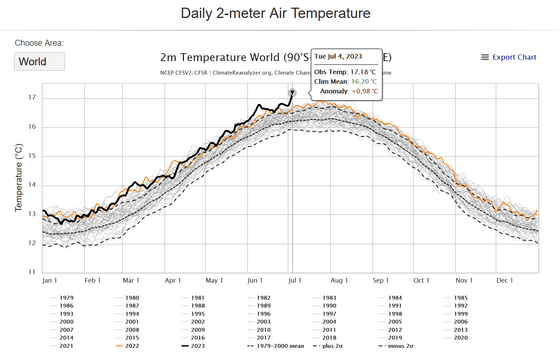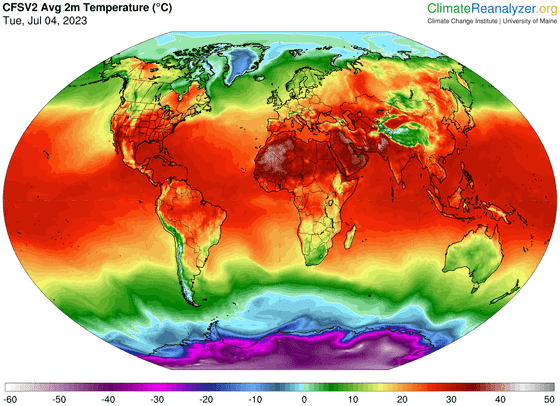July 4, 2023 was the hottest day in the last 125,000 years

A triple whammy of the seasonal cycle,
Climate Reanalyzer
https://climatereanalyzer.org/clim/t2_daily/
This July 4 was Earth's hottest day since records began, scientists say - The Washington Post
https://www.washingtonpost.com/climate-environment/2023/07/05/hottest-day-ever-recorded/
Below is a graph showing temperature trends created by the University of Maine Climate Change Institute based on data from the National Center for Environmental Prediction. On July 3, 2023, the global average temperature hit a record high of 17.01 degrees Celsius, but the record was broken in just one day.

According to Paulo Cheppi, a climate scientist at the Grantham Research Institute in the UK, the temperature was derived using data gathered from weather stations, ships, ocean buoys and satellites. Mr. Cheppi says about its accuracy, 'This is the best guess we can know about what the surface temperature was at various parts of the earth.'
The specific temperature distribution is color-coded as follows. In July, 57 million people in the United States were exposed to dangerous heat, the capital of China, Beijing, experienced a severe heat wave with temperatures exceeding 35 degrees Celsius every day, and temperatures exceeded 50 degrees Celsius in North Africa. rice field.

Cheppi infers the evolution of prehistoric temperatures from analyzes of tree rings and ice cores. I'm telling you that it didn't happen,' he said.
Experts believe temperatures will continue to rise unless action is taken to stem carbon emissions. 'The hottest days are when global warming, El Niño, and the annual cycle all come together,' says Miles Allen of the University of Oxford, England. It's not a standard one, and it will continue to be updated in the future.'
The Paris Agreement, adopted in 2015 in Paris, France, set the goal of limiting the increase in global average temperature to 'below 1.5 degrees above pre-industrial levels.' , warned that by 2027 this standard could be exceeded.
The World Meteorological Organization warns that the record heat wave will cause the first ``temperature rise of 1.5 degrees above the pre-industrial revolution'' in the history of observation by 2027-GIGAZINE

Temporarily exceeding the threshold does not mean that climate change is completely unavoidable. The more it becomes unmanageable, the more likely it is to intensify.
In particular, 2023 is expected to see an increase in the number of record-breaking hot days due to the El Niño phenomenon occurring for the first time in four years. “Unless we take swift action to reduce greenhouse gas emissions to net zero, warming will continue and temperature records will be broken more and more frequently,” warned Cheppi. rice field.
Related Posts:
in Science, Posted by log1l_ks






